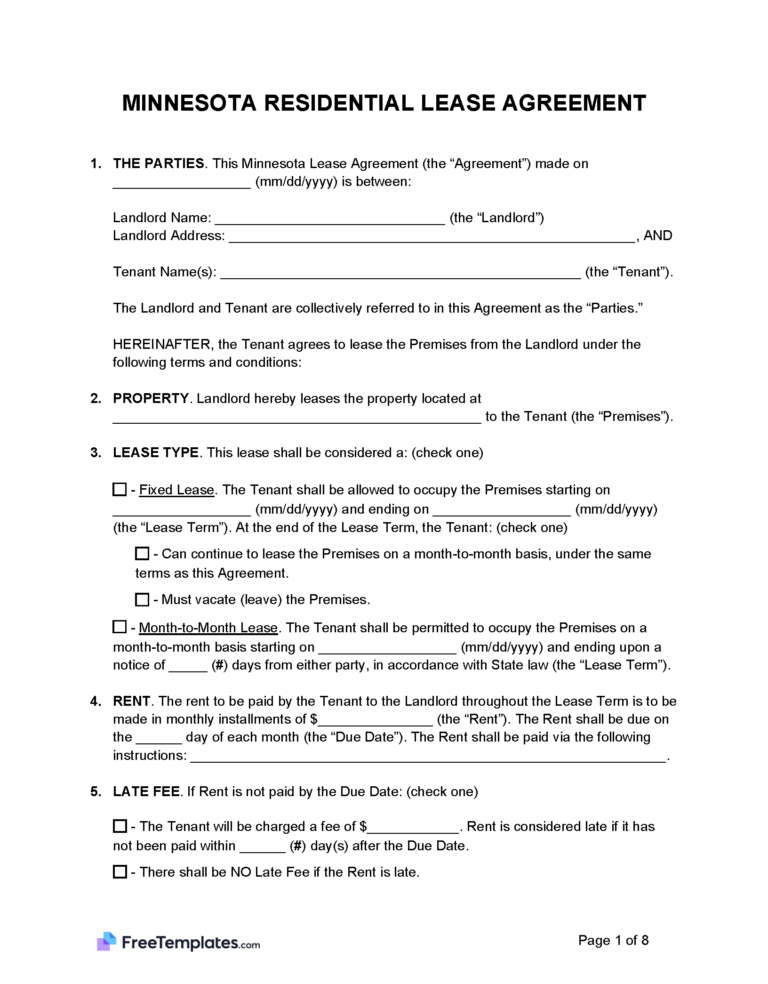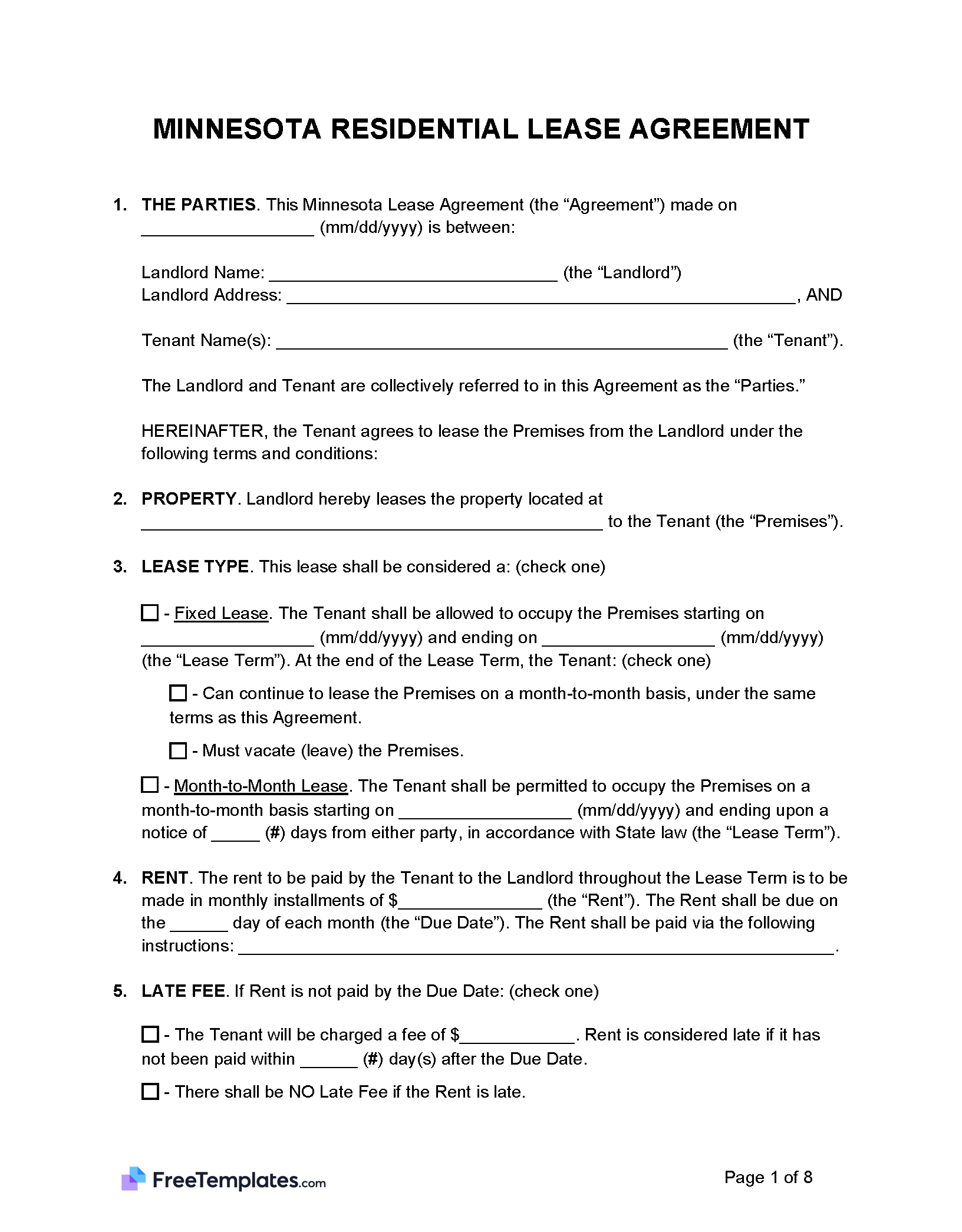By Type (6)
| Standard Lease Agreement – A legal document that outlines the terms and conditions of renting a residential property for a fixed amount of time, typically with the option to renew either monthly or for another term. |
| Commercial Lease Agreement – A contract between a business and a landlord that discloses the details of renting a property for commercial use. |
| Month-to-Month Lease Agreement – A legally binding document allowing a tenant to rent a residential property from a landlord for a short, month-long term that automatically renews unless proper notice is given. |
| Rent-to-Own Agreement – A standard lease contract that includes a provision allowing the tenant to purchase the rental property at a later date. |
| Roommate Agreement – An arrangement that helps avoid conflict between people who live together by clearly stating house rules, roles, and responsibilities. |
| Sublease Agreement – With the landlord’s written consent, the tenant can rent part or all of the rental property to a new tenant. The original tenant is still legally responsible for the lease agreement between themselves and the landlord. |
Disclosures (6)
Lead-Based Paint Disclosure – Under federal law, landlords must provide specific information about the dangers of lead-based paint and any hazards in a property built before 1978.
Landlord’s Contact Details – The lease must include the contact information for the landlord and/or their authorized agent who receives notices. (Minn. Stat. § 504B.181)
Covenant of Landlord and Tenants Not to Allow Unlawful Activities – Neither party will allow controlled illegal substances, prostitution, the unlawful use of a firearm, or stolen property in or in the common areas of the rental premises. (Minn. Stat. § 504B.171)
Financial Distress (conditional) – If the rental property has a contract cancellation or mortgage foreclosure, the landlord can only lease the unit for a maximum of two months. In addition, the landlord must disclose the situation to the tenant in writing. Failure to do so can result in a $500 fee. (Minn. Stat. § 504B.151)
Outstanding Inspection Orders (conditional) – The landlord must provide the tenant with any outstanding inspection orders related to health and safety in the lease or within 72 hours after the lease has been signed. (Minn. Stat. § 504B.195)
Disclosure of Fees – The Total Monthly Payment of any nonoptional fees must be listed on the first page of the lease. Additionally, landlords must include in the lease whether utilities are included in the rent. (Minn. Stat. § 504B.120)
Security Deposit
Maximum Amount – There is no maximum amount a landlord can charge for a security deposit in Minnesota.
Initial Inspection – If a security deposit is required, landlords must offer an inspection to identify any pre-existing conditions or issues in the rental unit within 14 days of moving in. (Minn. Stat. § 504B.182(1))
Move-Out Inspection – Landlords must inform their tenants of their right to request an inspection before they move out to identify and rectify any possible issues that could result in a deduction in their security deposit. (Minn. Stat. § 504B.182(2))
Collecting Interest – The security deposit must be kept in an interest-bearing bank account, and landlords must pay simple interest on the deposit. However, interest amounts of $1 or less are excluded from this state law. (Minn. Stat. § 504B.178(2))
Returning to Tenant – Within 3 weeks of the lease ending, the landlord must return the security deposit or a written statement explaining any withholdings mailed to the tenant’s new address. Landlords can only withhold funds for rent or damages beyond normal wear and tear. (Minn. Stat. § 504B.178(3))
Landlord Access
General Access – For reasonable business purposes, landlords can enter a rental unit with 24 hours’ notice, specifying the time of entry between 8 a.m. and 8 p.m. (Minn. Stat. § 504B.211(2))
Acceptable Reasons for Entry – A landlord can enter to show the property to new tenants, perform maintenance or inspection, address disturbances, enforce lease violations, or verify occupancy. (Minn. Stat. § 504B.211(3))
Emergency Access – Landlords can enter without notice if there is an immediate threat to the safety of the tenants or property or to comply with unlawful activities. (Minn. Stat. § 504B.211(4))
Paying Rent
Grace Period – Rent is due on the date detailed in the lease agreement. There is no state-mandated grace period in Minnesota.
Maximum Late Fee – Penalties for late rent must be disclosed in the lease agreement and cannot exceed 8% of the monthly rent. (Minn. Stat. § 504B.177(a))
Returned Checks (NSF) – While there is no Minnesota law regarding a fee for bounced or dishonored rent payments, the fee should be reasonable and disclosed in the lease agreement.
Reasons for Eviction (4)
Non-Payment of Rent – If the tenant does not pay rent, the landlord can issue a 14-day written notice outlining the nature of the pending eviction, including the total amount due and specific statements mandated by Minnesota law. This gives the tenant 14 days to pay in full or vacate the property. (Minn. Stat. § 504B.321(1a))
Unlawful Activities – If the tenant breaches the covenant, the landlord can bring an eviction notice, pending written approval from the county or city attorney. (Minn. Stat. § 504B.171(2))
Serious Damage or Harm – A landlord can file a complaint for an expedited eviction in instances where the residential tenant seriously endangers others’ safety or damages property. (Minn. Stat. § 504B.171(2))
Holdover – The landlord can evict the tenant if they remain in the rental unit after the lease term ends. (Minn. Stat. § 504B.285(1))

